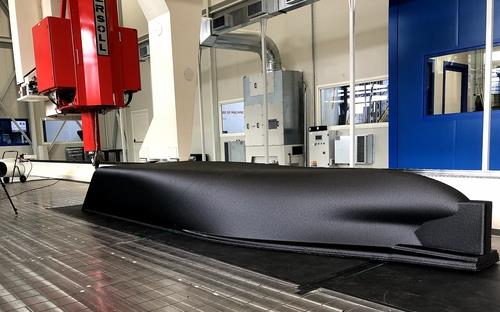
South Korean shipyard Daewoo Shipbuilding & Marine Engineering Co. said Tuesday it has successfully constructed a 3D-printed plastic model vessel that could help cut costs and improve productivity.
Daewoo Shipbuilding said it has joined hands with U.S. 3D printer maker Ingersoll in building the 10-meter-class, twin-skeg ship made of acrylonitrile-butadiene-styrene (ABS), which will be tested in its research lab in Siheung, about 26 kilometers southwest of Seoul.
It represents the first 3D-printed ABS model ship in the world, heralding the start of 3D printing in the shipbuilding industry, the shipyard claimed.
Currently, wooden model ships are used to create prototypes for building new vessels. Daewoo Shipbuilding said the new technology will likely reduce the 3-week production period of a model ship by up to 40 percent.
In addition, the new method is expected to help respond to customer demands for sudden tests in a quick and flexible manner, pare down costs by using an automated production system and enhance productivity, the company added.
"The breakthrough marks a key paradigm shift in manufacturing model vessels," a company official said. "It is also an example of our efforts to expand the new mantra of digitalization to all shipbuilding areas."
Daewoo Shipbuilding is the world's fourth-largest shipyard by order backlog. The shipbuilder has clinched orders for 20 vessels worth $4.61 billion so far this year, already achieving 51.8 percent of this year's order target of $8.9 billion. (Yonhap)


![[AtoZ into Korean mind] Humor in Korea: Navigating the line between what's funny and not](http://res.heraldm.com/phpwas/restmb_idxmake.php?idx=644&simg=/content/image/2024/04/22/20240422050642_0.jpg&u=)


![[Herald Interview] Why Toss invited hackers to penetrate its system](http://res.heraldm.com/phpwas/restmb_idxmake.php?idx=644&simg=/content/image/2024/04/22/20240422050569_0.jpg&u=20240422150649)
![[Graphic News] 77% of young Koreans still financially dependent](http://res.heraldm.com/phpwas/restmb_idxmake.php?idx=644&simg=/content/image/2024/04/22/20240422050762_0.gif&u=)
![[Exclusive] Korean military set to ban iPhones over 'security' concerns](http://res.heraldm.com/phpwas/restmb_idxmake.php?idx=644&simg=/content/image/2024/04/23/20240423050599_0.jpg&u=20240423183955)







![[Exclusive] Korean military to ban iPhones over security issues](http://res.heraldm.com/phpwas/restmb_idxmake.php?idx=652&simg=/content/image/2024/04/23/20240423050599_0.jpg&u=20240423183955)



![[Today’s K-pop] Ateez confirms US tour details](http://res.heraldm.com/phpwas/restmb_idxmake.php?idx=642&simg=/content/image/2024/04/23/20240423050700_0.jpg&u=)